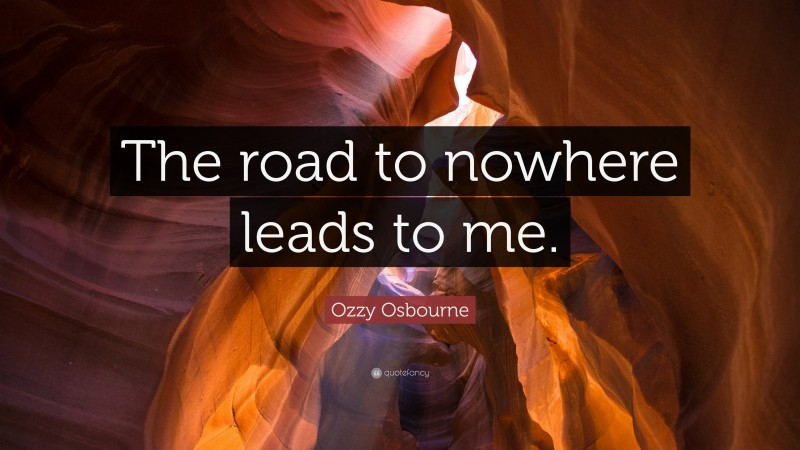

And his fans, whatever their reasons, still love him.Location: Izod Center, East Rutherford, NJ In the more than ten years that have passed since the original release of No More Tears, it seems Ozzy has changed little: he is still drinking, still touring, and still outrageous. In fact, despite past indications that Ozzy would retire, that road has not ended. But he still somehow believes that his “road to nowhere” will never end. He admits that the “road to nowhere” he has been traveling on will ultimately lead him back to himself, no matter how hard he tries to escape. On the album’s last song (not counting the two bonus tracks), “Road to Nowhere,” Ozzy looks honestly at the “wreckage” of his past. Another of Ozzy’s characters knows the pain will be “killing” him again the “morning after,” but he still can’t put down the drugs, he refuses to stop doing the “Zombie Stomp.” In his “selfish love” he is willing to take a “heart of stone.” He doesn’t care about “sunshine,” he’s “coming home,” no matter how hurtful it will be. The man described in “Mama, I’m Coming Home” is going back to a woman who hurt and deceived him, but he can’thelp himself. Some of these characters admit that what they are doing is not making them any happier, but they do it anyway. Tinkertrain”), or relationships (“Mama I’m Coming Home”). Instead, they try to numb themselves with touring (“Hellraiser”), drugs (“Zombie Stomp”), murder (“No More Tears”), molestation (“Mr. They refuse to get help, even though they know they are out of control. Most of the characters Ozzy and friends write about are depressed, tortured souls going insane over their pain. Lyrically, Ozzy and his band do the heavy lifting here, but they get help from Motorhead frontman Lemmy on four tracks. Wylde’s sweet acoustic fingerpicking and fuzzy power chords flavor “Mama, I’m Coming Home”, which builds to a crescendo on the strength of soaring backing vocals. Clocking in at over seven minutes, “No More Tears” also features tasteful synth work by keyboardist John Sinclair that reminds me of Bon Jovi and a melancholy piano interlude that brings to mind Queen’s “Bohemian Rhapsody”, another dramatic, multi-movement song. His chunkiest riff plays call-and-response with Ozzy’s vocals on “No More Tears”, and a deliciously sinuous lick graces its chorus. Wylde plays beautifully on two grandiose, melodic ballads, “Mama, I’m Coming Home” and “No More Tears”.

They suffer in comparison to the thick, dark playing of Sabbath axeman Tony Iommi and the ornate but forceful guitar work of the late Randy Rhoads. On the faster numbers, guitarist Zakk Wylde plays proficiently, but his riffs are often unmemorable and too heavily-processed. Musically, the rockers on this record lack the punch of Black Sabbath songs from the ’70s and Ozzy’s early ’80s solo work, but the ballads really shine. Listeners who already own a copy of No More Tears can skip buying this reissue unless they are completists. Both bonus tracks are cut from the same cloth as the original album, and neither of them stands out as particularly important. No More Tears, a comeback album of sorts, was first released in 1991 and here includes two additional songs: “Don’t Blame Me”, which was the B-side of “Mama, I’m Coming Home”, and “Party with the Animals”, from the soundtrack to Buffy the Vampire Slayer. Aren’t we all a little bit warped? Don’t we all feel down sometimes?Ĭashing in on the success of Ozzy’s MTV show, The Osbournes, Epic has remastered and reissued four of his solo albums with bonus tracks. In fact, many of Ozzy’s fans are probably attracted to his dysfunction and despair because they can relate. Ozzy is proof positive that anyone can become rich and famous, no matter how small their talents, how twisted their thoughts and behavior. So why do people still so adore him? While he was once quite entertaining in the role of a Satanic purveyor of doom, his charm today lies mostly in the fact that he is miserably screwed up and - at the same time - wildly successful. Unlike most metal frontmen, he whines about his misery and admits his weakness instead of proclaiming his prowess. Ozzy does not look like Morrissey, sing like Robert Plant, play like Eddie Van Halen, or write like Pete Townshend. He has become so well-known - even respectable - that he recently received an invitation from Queen Elizabeth.

Witness his three-decade string of platinum albums, his sold-out annual tours, and his starring role in the most talked-about show on TV. Nowadays, it seems like everybody loves Ozzy.


 0 kommentar(er)
0 kommentar(er)
